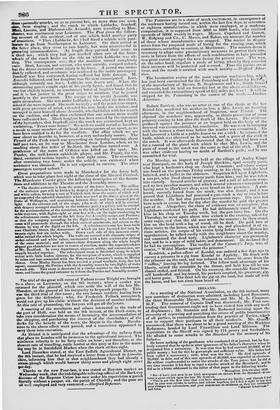Robert Bartlett, who was an actor at one of the
shows at the last Bristol fair, murdered his mother.in-law, a Mrs. Lewis, on Saturday afternoon, in the neighbourhood of Stapleton, near 13ristol. The objectof the murderer was, apparently, to obtain possession of some property coming to him after the death of Mrs. Lewis. The evidence produced against the prisoner at an inquest held on the body of the deceased was circumstantial, but conclusive. He was seen in company with the woman a short time before the murder was committed. Ile had borrowed a knife at a public-house to cut a stick : lie returned the knife, which was observed to be notched, and a piece of the stick in the notch. It was afterwards discovered that the stick had been used for a ramrod of the pistol with which he shot Mrs. Lewis, and the piece of wood in the notch was the same as that of tile stick. There was other evidence leaving no doubt of Bartlett's guilt ; and he was committed for trial.
On Monday, an inquest was held at the village of Areley Kings, near Stourport, on the body of Joseph Hawkins, aged seventy years, who kept a huckster's shop on Areley Common ; anti whose corpse was found on the previous Friday evening, in his shop, with the head battered, and a bullet in the abdomen. Suspicion fell upon Lightburn, a sawyer, who lived about twenty yards from him ; anal he was taken into custody. Several articles of grocery, and a roll of tobacco wrap- ped up in a peculiar manner, and which several witnesses recognized as having seen in Hawkins's shop, were found on his premises. A gun- barrel, recently forced from the stock, was also found ; and it was proved that Lightburn had procured a gun-stock a day or two before the murder. He had also purchased percussion-caps. His rent had been much in arrear, but the day after the murder he paid the greater part of it. Altogether, the chain of evidence was so complete, that Lightburn confessed his guilt. He had deliberately aimed at Haw- kins in his shop on Tuesday week, but the gun hung fire. On the Thursday, be went again about nine o'clock in the evening, asked for some sugar, and shot the old man across the counter ; he then snuck him on the head with a log of wood, till he died, He paid two or three visits to the house, which was shut up, and plundered it of va- rious articles, the corpse of his victim lying before him. Before his apprehension, he talked coolly with the neighbours about the murder, and examined the dead body. Lightburn's character was previously fair, and he is a man of mild habits and demeanour. He declared that he had no accomplices. The verdict of the Coroner's Jury, was, of course, " Wilful Murder against the prisoner."
Kendrick, a police-officer of Kendal, was ordered a few days ago to convey a prisoner in a gig from Kendal to Appleby. He drank with the prisoner on the road, and was induced to release his arms from the " ruffles," leaving his leg fettered. The fellow took advantage of his liberty, seized the constable by the throat, and held him till he was almost stifled, and fainted. On his recovery, the constable found him- self handcuffed and leg-ironed, his pockets emptied, his greatcoat, gig, and horse gone. The thief left the gig on the road, but made off with the horse, and has not since been heard of.


























 Previous page
Previous page